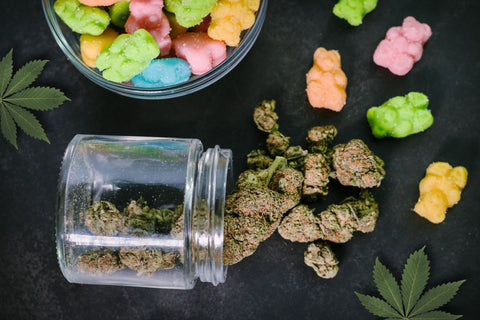Unwrapping the Green: Legality of Cannabis Edibles in Australia

Introduction
In a world where the use of cannabis for medicinal purposes is gaining momentum, it's essential to understand the legal landscape surrounding edibles in Australia. The Commonwealth and State and Territory governments have made significant strides in allowing cannabis cultivation and manufacture for medicinal purposes. However, the laws regarding the use of edibles remain a point of confusion for many.
This article aims to provide a comprehensive overview of the legality of edibles in Australia, shedding light on the existing cannabis laws, the use of medicinal cannabis, and the specific regulations concerning edibles.
Importance of Understanding the Legality of Edibles in Australia
The importance of understanding the legality of edibles in Australia cannot be overstated. With the increasing interest in cannabis for medicinal use, it's crucial for individuals to be well-informed about the legal boundaries and potential implications of using edibles. This knowledge empowers individuals to make informed decisions regarding the possession, use, and procurement of edibles, especially in the context of medicinal cannabis.
Legal Framework in Australia
Australia's legal framework regarding cannabis is a complex tapestry of federal and state-specific regulations. Understanding the current status of cannabis legality, federal laws and regulations, state-specific regulations, and recent updates and changes is crucial for gaining insight into the landscape of edibles' legality in Australia.
Current Status of Cannabis Legality
Cannabis remains largely illegal in Australia, with varying laws across different states and territories. While the federal government has legalized medicinal cannabis, the laws surrounding recreational use and edibles are still stringent.
Federal Laws and Regulations
Under federal law, the Narcotic Drugs Act of 1967 was amended in 2016 to allow the legal cultivation of cannabis for medicinal and scientific purposes. However, the recreational use of cannabis, including edibles, remains prohibited under federal regulations.
State-Specific Regulations
The laws and penalties for cannabis possession, use, and cultivation vary significantly from state to state. For example, the Australian Capital Territory allows individuals to grow a limited number of cannabis plants for personal use, while New South Wales imposes strict penalties for cannabis possession.
Recent Updates and Changes
Recent developments include the legalization of low-THC hemp food for human consumption by Food Standards Australia New Zealand and the passing of a bill in the Australian Capital Territory allowing for the possession and growth of small amounts of cannabis for personal use.
Edibles: Definition and Types

Explanation of What Constitutes "Edibles"
Edibles, in the context of cannabis, refer to food products or drinks that have been infused with cannabis extract, typically containing cannabinoids such as THC (tetrahydrocannabinol) or CBD (cannabidiol). These products are ingested as an alternative to smoking or vaping cannabis, offering a discreet and often more convenient way to consume the drug.
Different Forms of Cannabis Edibles Available in the Market
Cannabis edibles come in a diverse range of forms, offering consumers various options for ingestion. Some common forms of cannabis edibles include:
- Baked Goods: This category includes a wide range of items such as brownies, cookies, and cakes, all infused with cannabis extract.
- Candies and Gummies: Cannabis-infused candies and gummies are popular for their variety of flavors and shapes, often resembling non-cannabis-related confectionery.
- Chocolates: Cannabis-infused chocolates are available in various forms, including bars, truffles, and chocolate-covered nuts.
- Beverages: Cannabis-infused drinks, such as teas, coffees, and sodas, provide an alternative way to consume cannabinoids.
- Other Forms: Edibles can also include lozenges, mints, and even savory items like popcorn and potato chips.
Understanding the different types of cannabis edibles available in the market is essential for consumers to make informed choices about their consumption. Each form of edible may have different onset and duration of effects, making it important for individuals to understand their preferences and tolerance when using these products.

Historical Context
In 2016, a significant shift occurred in Australia's approach to cannabis, marking a pivotal moment in the country's legal landscape. Prior to this, cannabis was deemed illegal across the nation. However, the enactment of the Narcotic Drugs Amendment Act 2016 ushered in a new era, establishing a national licensing and permit scheme for the production and manufacture of cannabis for medicinal and scientific research purposes. This legislation represented a fundamental change, paving the way for the regulation of cannabis and cannabis products by the Office of Drug Control (ODC) and the Therapeutic Goods Administration (TGA).
The states and territories within Australia have exhibited varying stances towards cannabis, with Victoria emerging as a trailblazer by legalizing cannabis for medicinal use in 2016. New South Wales (NSW) also made substantial investments in the medicinal cannabis industry and eased patient access in 2018. Meanwhile, the Australian Capital Territory (ACT) took a bold step in 2020 by legalizing cannabis for recreational use, although this decision remains at odds with Commonwealth law and the legal situation in other states and territories.
The evolution of cannabis laws in Australia has been influenced by a confluence of factors. The growing body of evidence supporting the medicinal benefits of cannabis, shifting societal attitudes towards drug use, and the rising demand for alternative treatments for chronic conditions have all played a role in shaping the country's legal framework. Additionally, the global trend towards the legalization of cannabis has exerted a notable impact on Australia's approach to cannabis regulation, reflecting the interconnected nature of cannabis laws on a global scale.
This transition of cannabis into the mainstream of Australian healthcare has been a multifaceted journey, marked by significant legal and societal changes. The evolving legal framework and the factors driving these changes have set the stage for a dynamic and complex landscape surrounding the use of cannabis and cannabis products in Australia.
State-wise Analysis
Overview of Cannabis Laws in Major States
The landscape of cannabis laws in the United States is characterized by a patchwork of regulations, with variations in both medical and recreational cannabis legality across different states. As of 2023, 38 states have legalized cannabis for medical use, while 24 states have also legalized it for recreational use. Each state has its own set of laws and regulations governing the use, possession, and cultivation of cannabis, leading to a diverse and complex legal framework.
Variations and Nuances in Edibles Legality Across States
The legality of cannabis edibles also varies significantly from state to state. While some states have legalized the production and sale of a wide range of cannabis-infused edibles, others have more restrictive regulations. For example, in states where recreational cannabis is legal, a diverse array of edibles such as chocolates, gummies, and beverages are available in licensed dispensaries. On the other hand, in states with only medical cannabis legalization, the availability of edibles may be more limited and subject to stricter regulations.
It's important for consumers to be aware of these variations and nuances in edibles legality when navigating the cannabis market. Understanding the specific regulations in their state can help individuals make informed decisions about the purchase and consumption of cannabis edibles, ensuring compliance with local laws and regulations.
Potential Health Impacts

Brief Exploration of Health-Related Concerns
The consumption of cannabis edibles raises various health-related concerns, including the potential for overconsumption due to delayed onset of effects, accidental ingestion by children or pets, and the lack of precise data on the amount actually used. Additionally, the impact of cannabis use on alcohol and other substance use remains inconclusive, and the effects of policy on these impacts are not as well-studied as those of alcohol and tobacco.
Comparisons with Other Forms of Cannabis Consumption
Compared to other forms of cannabis consumption, such as smoking or vaping, edibles can lead to a delayed onset of effects and a longer duration of intoxication. This delayed onset can result in individuals consuming more than intended, leading to adverse effects. Additionally, the psychoactive effects of edibles can be more intense and prolonged compared to inhalation, posing potential risks to inexperienced users. It's important for individuals to understand these differences and consume edibles responsibly to mitigate potential health impacts.
The potential health impacts of cannabis edibles are a complex and evolving area of study. While they offer an alternative to smoking, their unique characteristics, such as delayed onset and prolonged effects, require careful consideration to ensure safe and responsible consumption. As the scientific community continues to explore the health effects of edibles, it's essential for consumers to stay informed and make educated choices regarding their use.
Regulatory Challenges and Advocacy
Legal Challenges Faced by Advocates
Navigating the labyrinth of legalities surrounding cannabis in Australia is akin to deciphering a cryptic puzzle. Advocates championing the cause of cannabis face a myriad of challenges. One prominent hurdle is the existing stigma attached to cannabis consumption, deeply rooted in historical perceptions. The clash between federal and state regulations further complicates matters, creating a complex web of legal constraints that advocacy groups must skillfully untangle.
In addition, the ever-evolving landscape of cannabis laws introduces a constant challenge. Advocates find themselves engaged in a perpetual game of catch-up as legislation undergoes frequent amendments. The lack of uniformity across states poses another barrier, requiring advocates to tailor their strategies according to the distinctive legal frameworks in each jurisdiction.
Efforts Towards Policy Reform
Undeterred by these challenges, passionate advocates have orchestrated a symphony of efforts aimed at reshaping cannabis policies in Australia. One notable endeavor involves comprehensive education campaigns. Advocacy groups tirelessly disseminate accurate information about the benefits of cannabis, debunking myths and fostering a more informed public discourse.
Strategic alliances with medical professionals and researchers constitute another crucial front. By collaborating with experts in the field, advocates bolster their arguments with empirical evidence, highlighting the medicinal potential of cannabis. Grassroots movements, powered by stories of individuals benefiting from cannabis, have also played a pivotal role in shaping public opinion.
Efforts extend beyond education to direct engagement with policymakers. Advocacy groups actively participate in consultations, proposing evidence-based policy changes. They lobby for a streamlined regulatory framework that not only acknowledges the medicinal benefits of cannabis but also addresses concerns about misuse.
International Comparisons
Brief Comparison with Cannabis Laws in Other Countries
The legalization and regulation of cannabis, including edibles, vary significantly across countries. For example, Canada took a national approach to recreational cannabis, leading to official legalization in 2018. In the United States, the approach has been more piecemeal, with individual states passing their own laws regulating adult use. Other countries, such as the Netherlands and Uruguay, have also implemented unique regulatory frameworks for cannabis, each with its own set of challenges and successes.
Lessons Australia Can Learn from Global Experiences
Australia can draw valuable lessons from global experiences with cannabis legalization and regulation. By examining the successes and challenges faced by countries like Canada and the United States, Australia can make informed decisions about its own regulatory framework. This includes understanding the impact of different approaches to legalization on public health, social justice, and the economy.
Additionally, Australia can learn from the various strategies employed to address the potential health impacts of cannabis use, particularly in the context of edibles. By leveraging these international comparisons, Australia can develop evidence-based policies that prioritize public health and safety while addressing the evolving landscape of cannabis legalization.
Future Outlook
Speculations on Potential Changes in Legislation
The future of cannabis legislation in Australia is a topic of significant speculation. As the medicinal cannabis market continues to expand, attention is increasingly turning towards the potential for recreational legalization. Efforts toward cannabis reform have been ongoing, with increasing public support for legalization and a blossoming medicinal cannabis sector. Experts predict that the Australian cannabis space will continue to grow, with the potential for a lucrative market if and when recreational use is legalized.
Emerging Trends in the Cannabis Industry
The cannabis industry is experiencing several emerging trends, with a particular focus on edibles. Many consumers prefer cannabis edibles to smoking due to reasons such as the lack of smell or second-hand smoke. Additionally, there is a growing interest in edibles as a discreet and more convenient way to consume cannabis. However, challenges associated with edibles, such as the delayed onset of effects and the potential for overconsumption, are also being closely examined.
The future of cannabis legislation in Australia and the emerging trends in the cannabis industry, particularly regarding edibles, are areas of great interest and potential growth. As the landscape continues to evolve, it will be essential to closely monitor these developments and their potential impacts on public health and regulatory frameworks.
Conclusion
The legality of edibles in Australia is a complex and evolving topic, with variations in laws and regulations across different states. The search results provide a comprehensive overview of the current state of cannabis laws in Australia, the potential health impacts of edibles, and the emerging trends in the cannabis industry.
It's important for individuals to stay informed about the specific laws and regulations in their state when navigating the cannabis market. Additionally, understanding the potential health impacts of edibles and consuming them responsibly can help mitigate potential risks.
As the landscape of cannabis legalization continues to evolve, ongoing awareness and research are essential. By drawing on international comparisons and examining the successes and challenges faced by other countries, Australia can develop evidence-based policies that prioritize public health and safety.
Overall, the search results highlight the need for continued research and monitoring to support evidence-based decision-making regarding the use and regulation of cannabis edibles in Australia.





